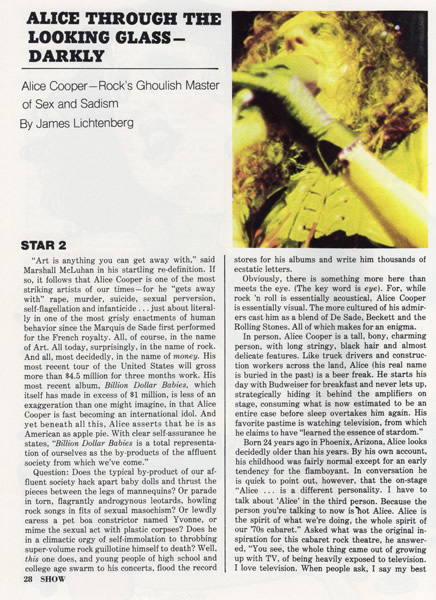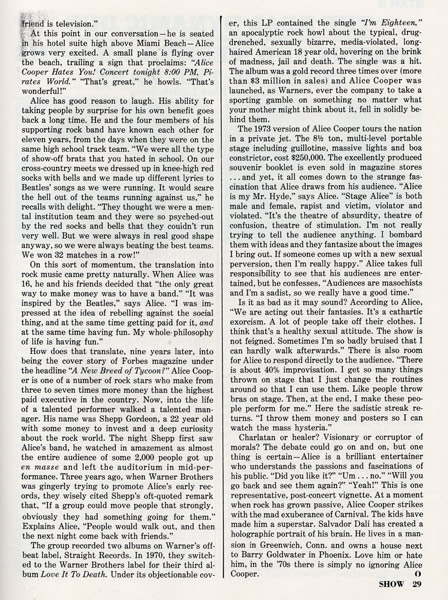Article Database
Alice Through The Looking Glass - Darkly
Alice Cooper - Rock's Ghoulish Master of Sex and Sadism
"Art is anything you can get away with," said Marshall McLuhan in his startling re-definition. If so, it follows that Alice Cooper is one of the most striking artists of our times - for he "gets away with" rape, murder, suicide, sexual perversion, self-flagellation and infanticide... just about literally in one of the most grisly enactments of human behavior since the Marquis de Sade first performed for the French royalty. All, of course, in the name of Art. All today, surprisingly, in the name of rock. And all, mostly decidedly, in the name of money. His most recent tour of the United States will gross more then $4.5 million for three months work. His most recent album, Billion Dollar Babies, which itself has made in excess of $1 million, is less of an exaggeration than one might imagine, in that Alice Cooper is fast becoming an international idol. And yet beneath all this, Alice asserts that he is as American as apple pie. With clear self-assurance he states, "Billion Dollar Babies is a total representation of ourselves as the by-product of the affluent society from which we've come."
Question: Does the typical by-product of our affluent society hack apart baby dolls and thrust the pieces between the legs of mannequins? Or parade in torn, flagrantly androgynous leotards, howling rock songs in fits of sexual masochism? Or lewdly caress a pet boa constrictor named Yvonne, or mime the sexual act with plastic corpses? Does he in a climactic orgy of self-immolation to throbbing super-volume rock guillotine himself to death? Well, this one does, and you people of high school and college age swarm to his concerts, flood the record stores for his albums and write hime thousands of ecstatic letters.
Obviously, there is something more here than meets the eye. (The key word is eye). For, while rock 'n roll is essentially acoustical, Alice Cooper is essentially visual. the more cultured of his admirers cast him as a blend of De Sade, Beckett and the Rolling Stones. All of which makes for an enigma.
In person, Alice Cooper is a tall, bony, charming person, with long stringy, black hair and almost delicate features. Like truck drivers and construction workers across the land, Alice (his real name is buried in the past) is a beer freak. He starts his day with Budweiser for breakfast and never lets up, strategically hiding it behind the amplifier on stage, comsuming what is now estimated to ban an entire case before sleep overtakes him again. His favorite pastime is watching television, from which he claims to have "learned the essence of stardom."
Born 24 years ago in Phoenix, Arizona, Alice looks decidedly older than his years. By his own account, his childhood was fairly normal except for an early tendency for the flamboyant. In conversation he is quick to point out, however, that the on-stage "Alice... is a different personality. I have to talk about 'Alice' in the third person. Because the person you're talking to now is not Alice. Alice is the spirit of what we're doing, the whole spirit of out '70s cabaret." Asked what was the original inspiration for this cabaret rock theatre, he answered, "You see, the whole thing came out of growing up with TV, of being heavily exposed to television. I love television. When people ask, I say my best friend is television."
At this point in our conversation - he is seated in his hotel suite high above Miami Beach - Alice grows very excited. A small plane is flying over the beach, trailing a sign that proclaims: "Alice Cooper Hates You! Concert tonight 8:00 PM, Pirates World."
Alice has good reason to laugh. His ability for taking people by surprise for his own benefit goes back a long time. He and the four members of his supporting rock band have known each other for eleven years, from the days when they were on the same high school track team. "We were all the type of show-off brats taht you hated in school. On our cross-country meets we dressed up in knee-high red socks with bells and we made up different lyrics to Beatles' songs as we were running. It would scare the hell out of the team running against us," he recalls in delight. "They thought we were a mental institution team and they were so psyched-out by the red socks and bells that they couldn't run very well. But we were alwyas in real good shape anyway, so we werw always beating the best teams. We won 32 matches in a row!"
On that sort of momentum, the translation into rock music came pretty naturally. When Alice was 16, he and his friends decided that "the only great way to make money was to have a band." "It was inspired by the Beatles," says Alice. "I was impressed at the idea of rebellion against the social thing, and at the same time getting paid for it, and at the same time having fun. My whole philosophy of life is having fun."
How does that translate, nine years later, into being the cover story of Forbes magazine under the headline "A New Breed of Tycoon?" Alice Cooper is one of a number of rock stars to make from three to seven times more money than the highest paid executive in the country. Now, into the life of a talented performer walked a talented manager. His name was Shep Gordon, a 22 year old with some money to invest and a deep curiosity about the rock world. The night Shep first saw Alice's band, he watched in amazement as almost the entire audience of some 2,000 people got up en masse and left the auditorium in mid-performance. Three years ago, when Warner Brothers was gingerly trying to promote Alice's early records, they wisely cited Shep's oft-quoted remark that, "If a group could move people that strongly, obviously they had something going for them." Explains Alice, "People would walk out, and then the next night came back with friends."
The group recorded two albums on Warner's off beat label, Straight Records. In 1970, they switched to the Warner Brothers label for their third album Love It To Death. Under the objectionable cover, this LP contained the single "I'm Eighteen," an apolcalytic rock howl aobut the typical, drug drenched, sexually bizarre, media-violated, long haired American 18 year old, hovering on the brink of madness, jail and death. The single was a hit. The album was a gold record three times over (more than $3 million in sales) and Alice Cooper was launched, as Warners, ever the company to take a sporting gamble on something no matter what your mother might think about it, fell in solidly behind them.
The 1973 version of Alice Cooper tours the nation in a private jet. the 8 1/2 ton, multi-level portable stage including guillotine, massive light and boa constrictor, costs $250,000. The excellently produced souvenir booklet is sold in magazine stores... and yet, it comes down the the strange fascination that Alice draws from his audience. "Alice is my Mr. Hyde," says Alice. "Stage Alice" is both male and female, rapist and victim, violator and violated. "It's the theatre of absurdity, theatre of confusion, theatre of simulation. I'm not really tyring to tell the audience anything. I bombard hemwith ideas and they fantasize about the images I bring out. If osmeone comes up with a new sexual perversion, then I'm really happy." Alice takes full responsibility to see that his audiences are entertained, but he confesses, "Audiences are masochists and I'm a sadist, so we really have a good time."
Is it as bas as it may sound? According to Alice, "We are acting out their fantasies. It's a cathartic exorcism. A lot of people take off their clothes. I think that's a healthy sexual attitude. The show is not feigned. Sometimes I'm so badly bruised that I can hardly walk afterwards." There is also room for Alice to respond directly to the audience. "There is about 40% improvisation. I get so many things thrown on stage that I just change the routines around so that I can use them. Like people throw bras on stage. Then, at the end, I make these people perform for me." Here the sadistic streak returns. "I throw them money and posters so I can watch the mass hysteria."
Charlatan or healer? Visionary or corruptor of morals? The debate could go on and on, but one thing is certain - Alice is a brillant entertainer who understands the passions and fascinations of his public. "Did you like it?" "Um...no." "Will you go back and see them again?" "Yeah!" This is one representative, post-concert vignette. At a moment when rock has grown passive, Alice Cooper strikes with the mad exhuberance of Carnival. The kids have made him a superstar. Salvador Dali has created a holographic portrait of his brain. He lives in a mansion in Greenwich, Conn. and own a house next to Barry Goldwater in Phoenix. Love him or hate him, in the '70s here is simply no ignoring Alice Cooper.





